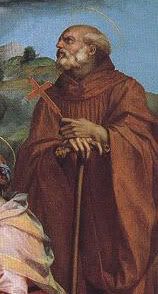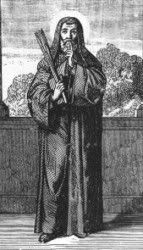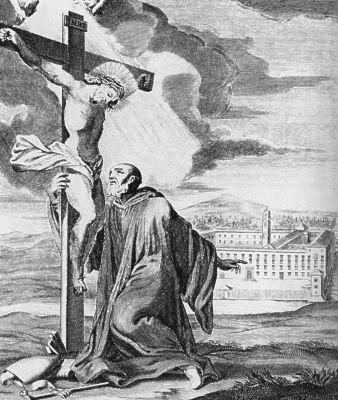Today, July 12, we celebrate the feast day of Saint John Gualbert (985-1073), Abbot, founder of the Vallumbrosan (Benedictine) Order, and soul converted by the Lord to create change in the world. Saint John experienced a dramatic moment of conversion early in his life—a momentary encounter with the Crucified Christ which inspired him to great acts of mercy and charity. Today, on his feast day, we pray for the same experience of Our Lord, looking for our own opportunities of mercy and charity toward others.
Born in Florence, Italy, John was a member of Florentine nobility. Although he was thoroughly educated in Christian doctrine and faith, his privileged status as a young noble allowed him ample opportunity to participate in the vanities and debaucheries of the world. While he was still relatively young, his only brother, Hugo, was murdered, and true to the time period, John had resolved to avenge his death.
It was on Good Friday when the Lord opened his eyes to wickedness of his ways, and through grace, created a refined and converted soul within him. On Good Friday, as John was riding into Florence through a narrow mountain pass, he encountered his brother’s murderer. The pass was such than neither could avoid each other, and no one was present to intervene. John drew his sword, preparing to avenge his brother’s death, as was customary at the time. His adversary, who was totally unprepared to fight, fell upon his knees with his arms outstretched in the form of a cross, and implored him, for the sake of Our Lord’s holy Passion, to spare his life. Saint John said to his enemy, “I cannot refuse what you ask in Christ’s name. I grant you not only your life, but my friendship. Pray that God may forgive me my sin!” They embraced and parted, and John made his way straight to a church in Florence. There, kneeling before the crucifix, John saw Jesus Crucified bow His head, acknowledging his act of forgiveness and, by the same token, forgiving him all his sins.
John’s heart was changed. He abandoned his former ways—the ways of the world-- and devoted himself to prayer and penance in the Benedictine Order. His virtue and austerity were so great that when his abbot died, he was unanimously chosen to replace him. Out of humility, however, John refused the honor. Instead, he left the monastery to live as a hermit, alone, in monastic solitude, contemplating the Passion of Our Lord.
He retired to Vallombrosa, and along with two other hermits, founded the Order of Vallumbrosan, which followed the austere Rule of Saint Benedict. From this shady valley, a few miles from Florence, the Order spread over Italy.
Miracles were attributed to the great faith of Saint John Gualbert. During famine, his prayers were said to fill the empty storeroom of the monastery with so many provisions that not only was the Order fed, but all the poor who presented themselves went away with rations to spare. On another occasion, when he found one of the monasteries too rich (and therefore in violation of the austerity of the Benedictine Rule), he prayed that a small stream which trickled past the building would overflow and reduce their wealth. Without delay, the stream destroyed the building, and the monks realized their greed. Yet another time, a convent was plundered set fire to by thieves, who beat and injured the monks who were present. Upon arrival at the convent, Saint John rejoiced. “Now,” he said, “you are true monks. Oh, how I envy your lot!” Saint John went on to build several monasteries throughout the region, dying peacefully at age 80 while Angels were singing near his bed.
From an extract of life compiled by Blaise Melanisius, general of the Order:
“The eminent degree of penance and sanctity to which the divine grace raised this saint, was the fruit of his mildness in forgiving an injury. Christ not only commands us to pardon all offences, but has recommended this precept to us with his expiring breath, with his head crowned with thorns and his hands stretched out for us. We renounce the glorious title of being his disciples if, whilst we behold him hanging on the cross, and hear his last prayers, we trample on his sacred law, and harbor malice in our hearts against a brother whom our dying Redeemer commands us to forgive for his sake. Can we be angry with him who is by so many sacred ties our brother, the living son and member of our common Redeemer and Father, and whom we expect to be the associate of our happiness for all eternity? We owe infinitely more to Christ than any brother can owe to us: the least venial sin is an immense debt. Our Divine Master not only conjures us to forgive our brother for His sake, but also makes it our own infinite interest so to do, promising to pardon us our immense debts in the same manner as we pardon others. Shall we base worms who have nothing to boast of before men only our having concealed from them our baseness and ignominy; and to whom the most cruel outrages from creatures would be too mild a treatment, considering our sins; shall we, I say, complain of injuries which we ought to receive with patience and joy as the easy means of canceling our own sins, and procuring for ourselves the greatest graces and mercy?”
Almighty and ever-living God,
source of peace and lover of concord,
to know Thee is to live, to serve Thee is to reign;
establish us in Thy love,
that by the example of the blessed abbot John Gualbert,
we may render good for evil and blessings for curses,
and so obtain from Thee both pardon and peace.
Amen.
Why pray the Rosary every day for a year?
Each time the Blessed Virgin has appeared-- whether it be to Saint Bernadette Soubirous at Lourdes; to Lucia, Jacinta, and Francisco at Fatima; or to Mariette Beco at Banneux-- she has asserted the importance, saving grace, and power of praying the Holy Rosary on a daily basis. Based upon her words, the Rosary is penance and conversion for sinners, a pathway to peace, an end to war, and a powerful act of faith in Jesus Christ. Pope Paul VI presented the Rosary as a powerful means to reach Christ "not merely with Mary but indeed, insofar as this is possible to us, in the same way as Mary, who is certainly the one who thought about Him more than anyone else has ever done."
To show us how this is done, perhaps no one has been more eloquent than the great Cardinal Newman, who wrote: "The great power of the Rosary consists in the fact that it translates the Creed into Prayer. Of course, the Creed is already in a certain sense a prayer and a great act of homage towards God, but the Rosary brings us to meditate again on the great truth of His life and death, and brings this truth close to our hearts. Even Christians, although they know God, usually fear rather than love Him. The strength of the Rosary lies in the particular manner in which it considers these mysteries, since all our thinking about Christ is intertwined with the thought of His Mother, in the relations between Mother and Son; the Holy Family is presented to us, the home in which God lived His infinite love."
As Mary said at Fatima, "Jesus wants to use you to make Me known and loved. He wishes to establish the devotion to My Immaculate Heart throughout the world. I promise salvation to whoever embraces it; these souls will be dear to God, like flowers put by Me to adorn his throne."

Subscribe to:
Post Comments (Atom)













0 comments:
Post a Comment
Thanks for leaving a comment. If you wish to submit a prayer request, however, please do so above, using the "Contact" tab.